"Trans" is getting big. Should kids be allowed to transition? (Patreon)
Content
Calm down dude, you need to get off Twitter.
…was my initial reaction when I saw Jordan Peterson’s tweet about Elliot (previously Ellen) Page. “Remember when pride was a sin? And Ellen Page had her breasts removed by a criminal physician,” he wrote. I thought it was crass of Peterson to call Elliot Page a sinful narcissist in front of 3 million people while at the same time calling the physician who respected the wishes of a fully-grown, 35 year old adult “criminal.” Before long, he received a suspension from Twitter and was notified that he must delete the tweet.
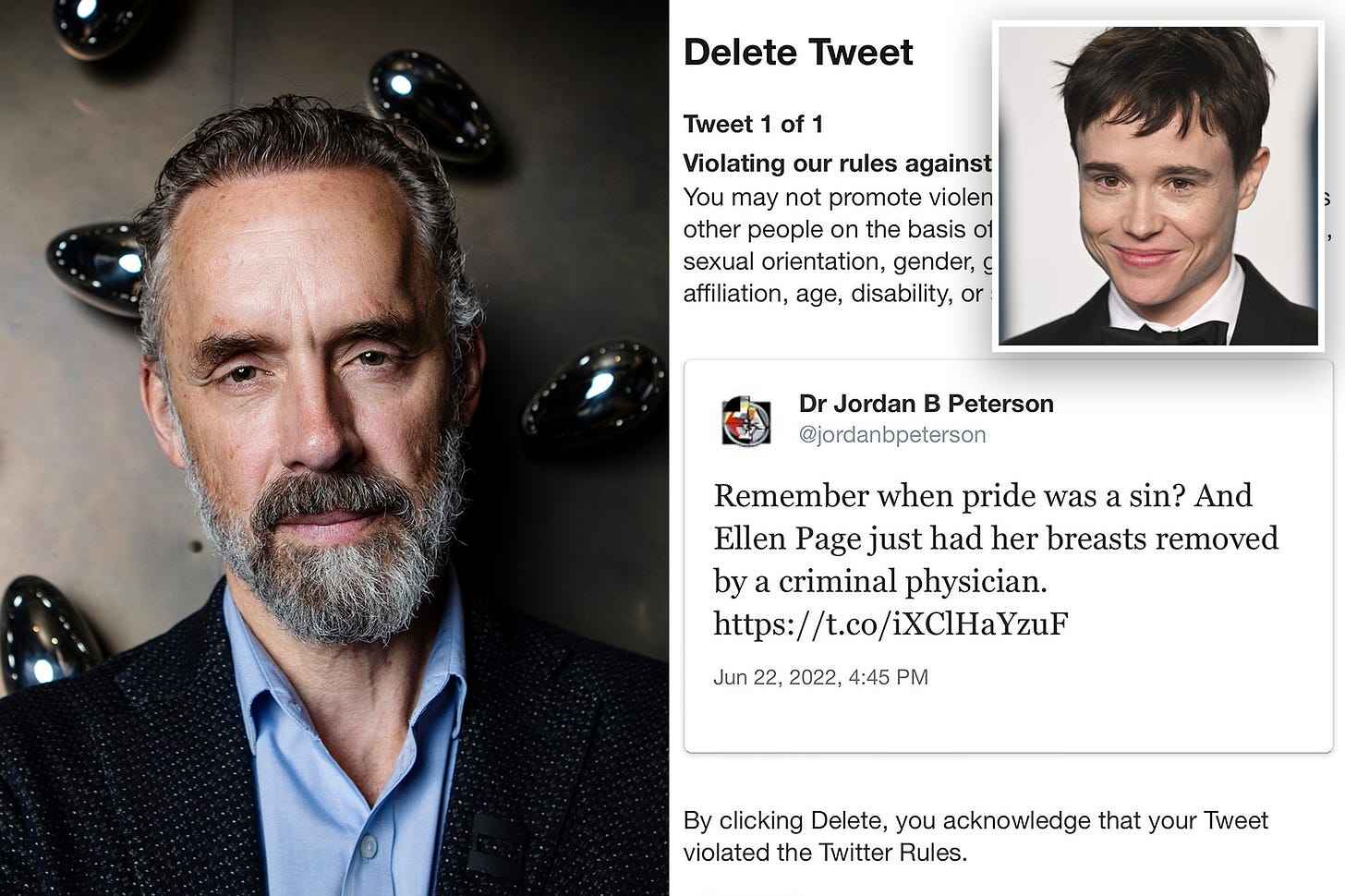 </figure>
</figure>We’ll come back to this in a moment, but first let me ask you a question: Have you ever thought if you could achieve something, go somewhere or change something about yourself it would solve all your problems? What about feeling what way yet not knowing exactly what that one thing was?
The massive problem with giving a new choice to kids
<figure> </figure>
</figure>In a TEDx Talk at the University of Nevada, a pediatric endocrinologist Tandy Aye starts off by telling the story of parents who knew they needed to advocate for the rights of their 12 year old son who identifies as a girl and they decided to allow her to live in her “affirmed gender.” These parents then took their child, Avery, to a gender clinic for kids to start her on gender affirmation therapy which is the use of “medicines and possibly surgery later on to physically align someone with the gender at which they identify.” Tandy Aye explains she is one of the doctors who treat children like this at Stanford Children’s Health.
Tandy Aye matter-of-factly explains how she can simply put puberty “on hold” for children like Avery. She says she can put Avery on a pubertal blocker for 2 to 3 years and then add estrogen if necessary. However, if Avery then decides that developing into a male would be preferable, Tandy Aye can stop the drug and Avery will go through “the pre-programmed puberty that she was supposed to have.”
Aye makes it sound like the puberty stopping drug is like getting a forbearance on your student loans, just a bit of extra time to think while you figure things out. “Later on, she can decide if gender affirmation surgery is right for her or not,” she says, slowly lingering on each word of “gender affirmation surgery” as if she’s explaining to you a new type of exciting technology.
Puberty is a complex phenomenon involving multiple hormones including leptin, androstenedione, DHEA, DHEAS, cortisol, FSH, luteinizing hormone, testosterone, andestrogen, estradiol, growth hormone, thyroid stimulating hormone, thyroxine, and triiodothyronine just to name a few.(S) Yet, for Tandy Aye it’s just a matter of starting or stopping a “program” with her pill of choice.
<figure> </figure>
</figure>Though, it does seem pretty reasonable. If a parent thinks that their son truly troubled by the fact that they weren’t born a girl, and if you can put the child’s puberty on pause to give them more time to think about whether they want to develop with male characteristics or female characteristics, then why not?
We will look in depth at why puberty blocking drugs are not in fact" “reversible” in another post, but let’s think about the consequences of even presenting this choice to the child.
Are anabolic steroids the solution to being emasculated as a teenager?
The prefrontal cortex of the brain, the region essentially responsible for good decision making, doesn’t fully develop until around age 25.(S) Looking back on myself as a teenager, it’s easy to see that I:
(1) Made decisions without too much thought
(2) Was easily influenced by my peers and media
(3) I became very adamant and confident once the decision was made.
While it sounds very distressing to be totally uncomfortable in your own skin, bear with me while we consider different agents that affect the endocrine system.
<figure>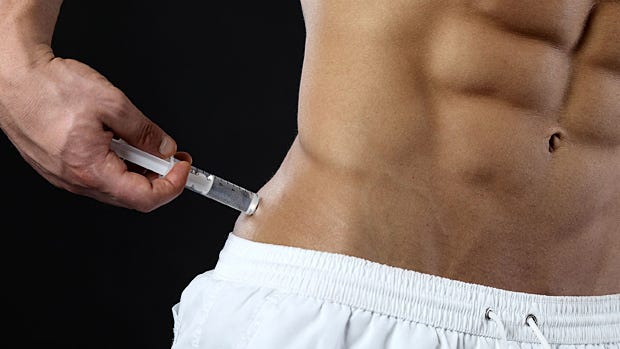 </figure>
</figure>Let’s imagine for a moment that it was the cool and socially acceptable thing for boys under the age of 18 to inject testosterone. They were celebrated for “embracing their masculinity,” their peers praised them for doing so, the media was talking more and more about how boys who identify as more masculine than their endocrine system affords need to be able to receive the care they need.
From my experience, it can be very distressing in high school to feel you’re not as masculine as you’d like to be. I remember when I was a freshman, a pregnant teenager suddenly appeared in the aisle of the school bus, shouting and hitting me for being in her way. I never had a girl close to my age, much less a pregnant one, suddenly be so aggressive to me. I quickly swiveled my legs out of the aisle and awkwardly slunk back into my seat. Seeing this, she turned to my older brother and asked him why I was such a wimp. Literally all of my friends being seated close by on the bus during this ordeal made it exceedingly embarrassing. One of my best friends leaned over the back of my seat and said “Hey. Don’t be scared like that.” I still remember her look of utter disdain - that was the most pathetic and weak I had ever felt.
This was something of a “new chapter” in my life. I absolutely hated how I felt in that situation and had to figure out prevent myself from feeling like that again. After getting home, I dejectedly puttered around the house trying to puzzle out the appropriate thing to do here. I hadn’t even done anything, so what exactly could I have done to prevent that? Why was she so annoyed with my presence but seemed to more or less respect my brother? I figured the difference between my brother and I was that he was older and had more muscle than me. His more masculine presentation earned him more respect at a glance, I surmised. The problem wasn’t that I did anything, but that I looked like a weakling. (I don’t think you need an academic paper to tell you I was on the right track.) With four years of high school ahead of me, I had to put on some muscle mass at all costs. That day, I went and asked my Dad for some help. I whined that I wanted to get stronger but I couldn’t even do a pull up. He told me to just hang there and try to do one - this works your arms out, so eventually you will be able to actually do a pull up. He was right and that put me on the right track.
Now let’s imagine that this happened instead: I didn’t talk to my Dad, but went on youtube and watched videos made by extra muscular 15 year olds talking about how great it was to take anabolic steroids; gaining the respect of their male peers and no longer being the target of bullies. Then I decided that was the solution to a problem that felt incredibly important to me at the time. After talking to my peers and hearing how understanding and encouraging they were - telling me “if you really feel that’s who you are, you should follow through on it,” I decided I wanted to take anabolic steroids. I talked to some adults I trusted who supported me and “affirmed” my choice. I eventually convinced my parents that this is what I needed to feel whole, so they took me to a pediatric endocrinologist who provided various anabolic steroids for me to physically align myself with the level of masculinity I identified with.
Making a permanent decision for a changing brain
Brain plasticity essentially refers to the brain’s capacity to mold and change, modifying a person’s behavior patterns. Norman Doidge wrote a famous book titled The Brain that Changes itself detailing how dramatically even adults’ brains can change. Compared to adults, however, adolescent brains are very plastic. A 2013 paper titled Maturation of the Adolescent Brain explains how “environmental exposure [is an] important component of brain plasticity during adolescence.” The paper notes how “substance abuse has a significant impact on the maturation of the adolescent brain.” Steroids are known to increase irritability, anxiety and aggression and cause mood swings, manic symptoms and paranoia.(S) Considering this, it’s safe to say that injecting an exogenous substance with powerful effects on the endocrine system, modifying your emotional response to stress while your brain is in the midst of developing… may have undesirable and permanent effects on your personality.
<figure>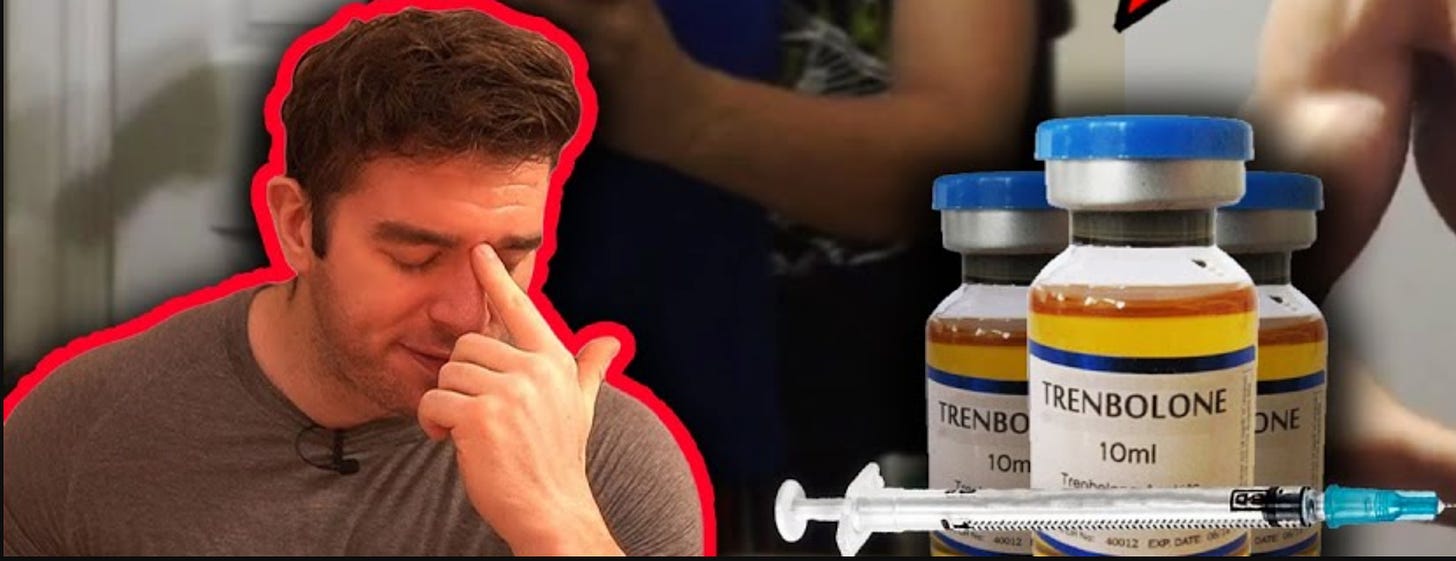 </figure>
</figure>Derek of the channel MorePlatesMoreDates came to notoriety in part thanks to his frank telling of his extensive personal experience with anabolic steroids. In this video of his, he’s taken aback by a 14-year old who took trenbolone, an anabolic steroid notorious for its off-the-walls side effects. Near the end of the video, he warns the viewers that because puberty and the endocrine system in general is so complicated, if someone really has a strong desire to take steroids, they should research the topic for a couple years before they try anything - and if they’re still dead set on it, they should wait until their twenties at least.
In comparison, this message of youtuber Derek’s seems more responsible than pediatric endocrinologist Tandy Aye’s.
There will be kids like this one featured in a BBC segment that will insist on taking the drugs despite the stigma and knowing of the negative effects of them. The good news here is that there is a stigma to teens taking anabolic steroids, they’re illegal without a prescription and no responsible adult would encourage a kid to take them to be “supportive.”
A kid who spends enough time online hearing other kids excitedly explaining how buff they got from steroids may be inspired to eagerly seek out steroids. If their plan leaks out into the real world to some adults, the adult’s forceful disapproval may be the last line of defense preventing the kid from actually going and haphazardly taking steroids.
A 2018 study about Rapid-onset gender dysphoria documented an increasing trend among adolescents to self-diagnose as transgender after bingeing on websites like Tumblr, Reddit, and Youtube.” So what happens when a kid goes online, becomes convinced that gender dysphoria is the root of their angst (angst of which most teenagers have plenty to spare) and that the solution is to transition? Are they going to get a reality check or “support” and “treatment” from a doctor?
Hannah Philips was featured in a BBC Newsnight segment where she explained she started taking puberty blockers at age 16. “She was told how little was known about the treatment but wanted to go ahead anyway,” the narrator explained. Hannah said herself “No one really questions whether it’s harmful to your body. I think we’re just so young that we kind of just trust the doctors. For me, I don’t think there could have been anything that the doctor could have said that would have stopped me from wanting to go on to hormone blockers.”
Perhaps this analogy with steroids doesn’t feel fair, since a healthy adolescent male can build some muscle even without anabolic steroids. However, for a child with gender dysphoria, the only option for putting them into the body that they think they want is drugs and/or surgery. But how does that adolescent know that that desire to change genders won’t resolve on its own? The Society for Evidence Based Gender Medicine reports on a 2016 paper finding 61-98% “of children reidentifying with their biological sex during puberty.”
They also present a massive uptick in the number of kids being referred for Gender Dysphoria in just the last decade.
<figure>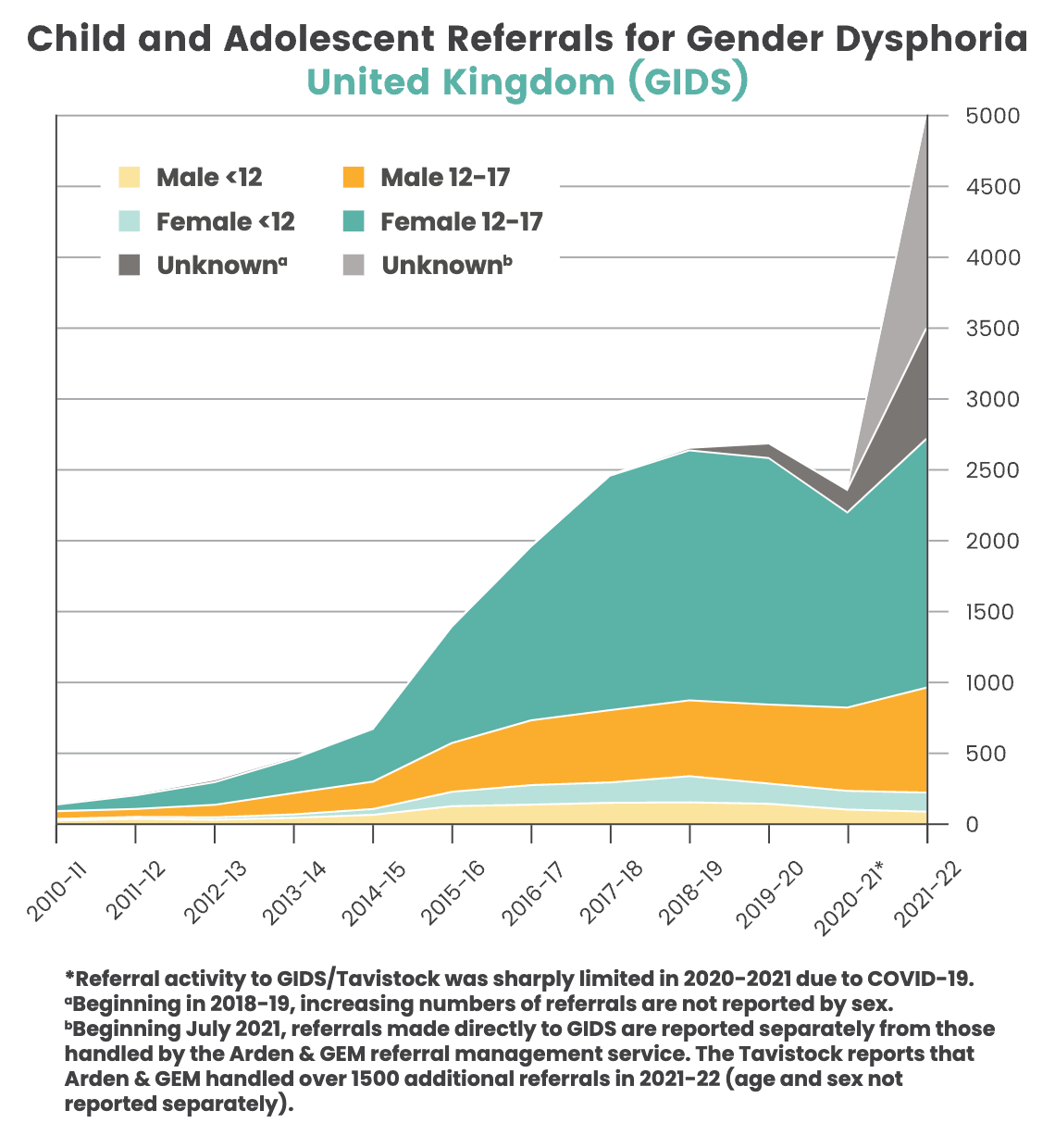 </figure>
</figure>The massive rise in cases of gender dysphoria seems to have started in 2014. The Rolling Stones published an article in December 2014 titled 11 Ways 2014 Was the Biggest Year in Transgender History, noting that it was a landmark year for transgender people on television, it was a “golden age” for transgender models, and that Facebook announced that the site would now allow users to select from over 50 gender identities and three gender pronouns (he, she or they). Could this increase in cases of gender dysphoria be the result of kids looking watching a TV show or social media post and thinking “Hey, I didn’t know I could switch genders and be praised for it…” ?
The trouble with getting what you wanted
<figure> </figure>
</figure>In a PBS Frontline article titled What’s It Like to Start Taking Testosterone at Age 15? they write: “Isaac was among the first wave of kids in the U.S. to medically transition from one gender to another. In middle school, he cut his hair and started dressing in boys’ clothes. By 15, he was taking testosterone.”
Isaac enjoyed the muscles and deep voice, but he was surprised by how his emotional responses changed, noting that things that used to make him sad now made him angry.
“And maybe some of that is because it’s really frustrating not to be able to cry, but, it’s very, very, very clear the emotional effect that testosterone has.”
Isaac, now 20, seems to now understand that at the time he was a kid, he didn’t entirely understand what it would like to be on male hormones. Neither did he understand what it would be like to be 20.
“It is super easy as a kid to hear, ‘These things are irreversible,’ and be like, ‘OK, I don’t care, I want it.’ Because … you don’t think of time in the same way when you’ve only experienced a tiny little sliver of it,” explains Isaac.“I think it’s become really clear in recent years that any sort of big problems that I thought I would fix by transitioning weren’t really fixed,” Isaac tells FRONTLINE. “None of this is to say that I made any sort of wrong decision or regret transitioning.” But he adds, “ultimately it’s kind of hard to speak about how I feel my gender without there being some element of regret or at least of fear I think a little bit of what the implications of my choices are.”<figure>
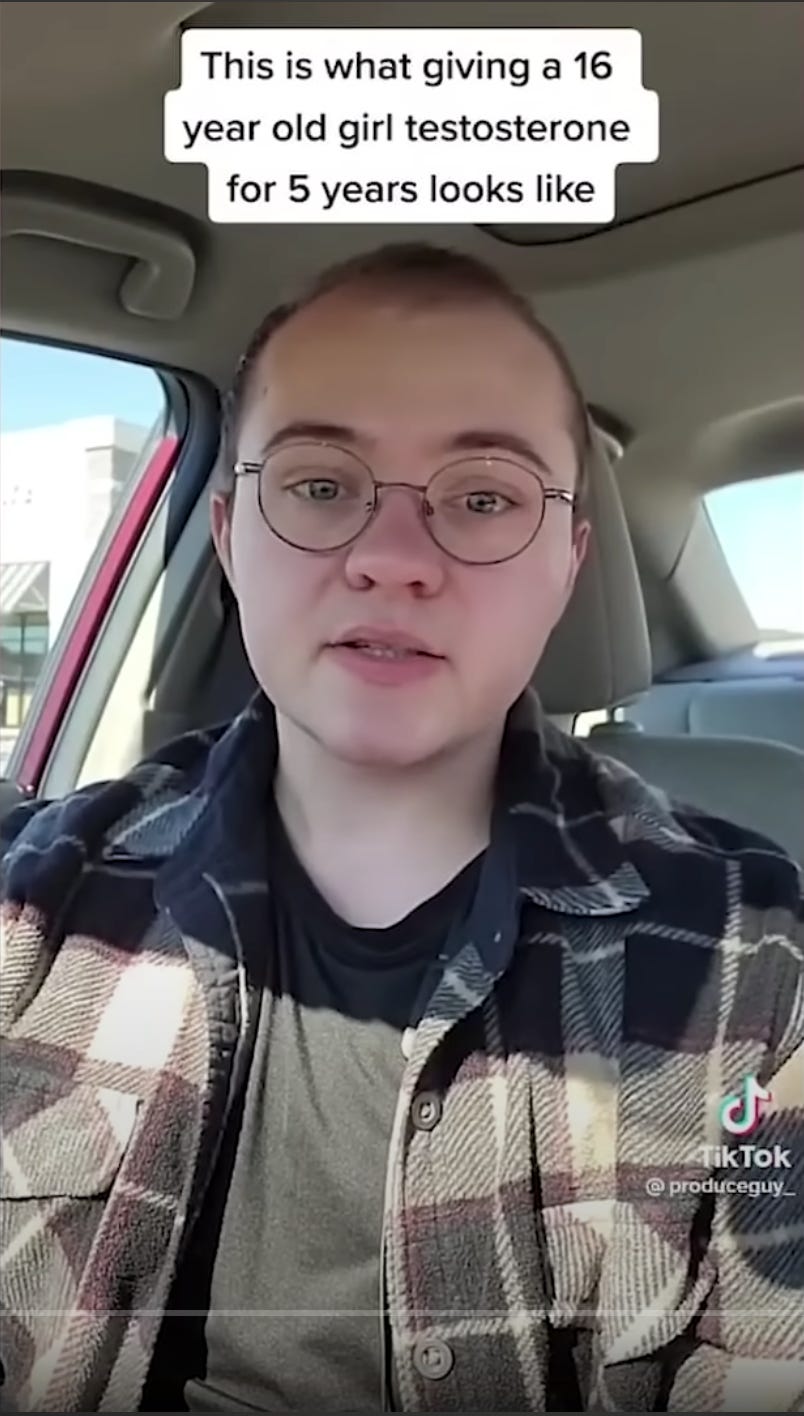 </figure>
</figure>KC Miller explains in his TikTok post that he is “too far gone.” What he means by this is that he understands that the deepening of his voice and thinning of his hair cannot be reversed. Eight days ago, he released a video on youtube explaining he will be medically reversing his gender transition.
<figure> </figure>
</figure>Amidst the online wave of trans acceptance, stories of regretful ‘detransitioners’ are starting to pop up.
<figure> </figure>
</figure>In a video titled I became Transgender. Here’s why I regret it , Walt Jensen (born as a boy, became a woman, is now a man) explains that his Grandma putting 4 year old him in a girl’s dress and telling him how cute he looked communicated to him that there was something “radically wrong with the boy that I really was.” He had that dress for 2 years and hid it from his parents, wearing it only in front of his Grandma. He said he would wear it when he was alone and could hear in his head the warm praise he enjoyed receiving from his Grandma.
The trauma from his father beating him and his uncle molesting him left him a broken child that felt uncomfortable with who he was. Later in life, he went to a gender specialist who promptly diagnosed him with Gender dysphoria and prescribed a “treatment” of hormones and surgery for him. The gender specialist happened to be a transgender activist.
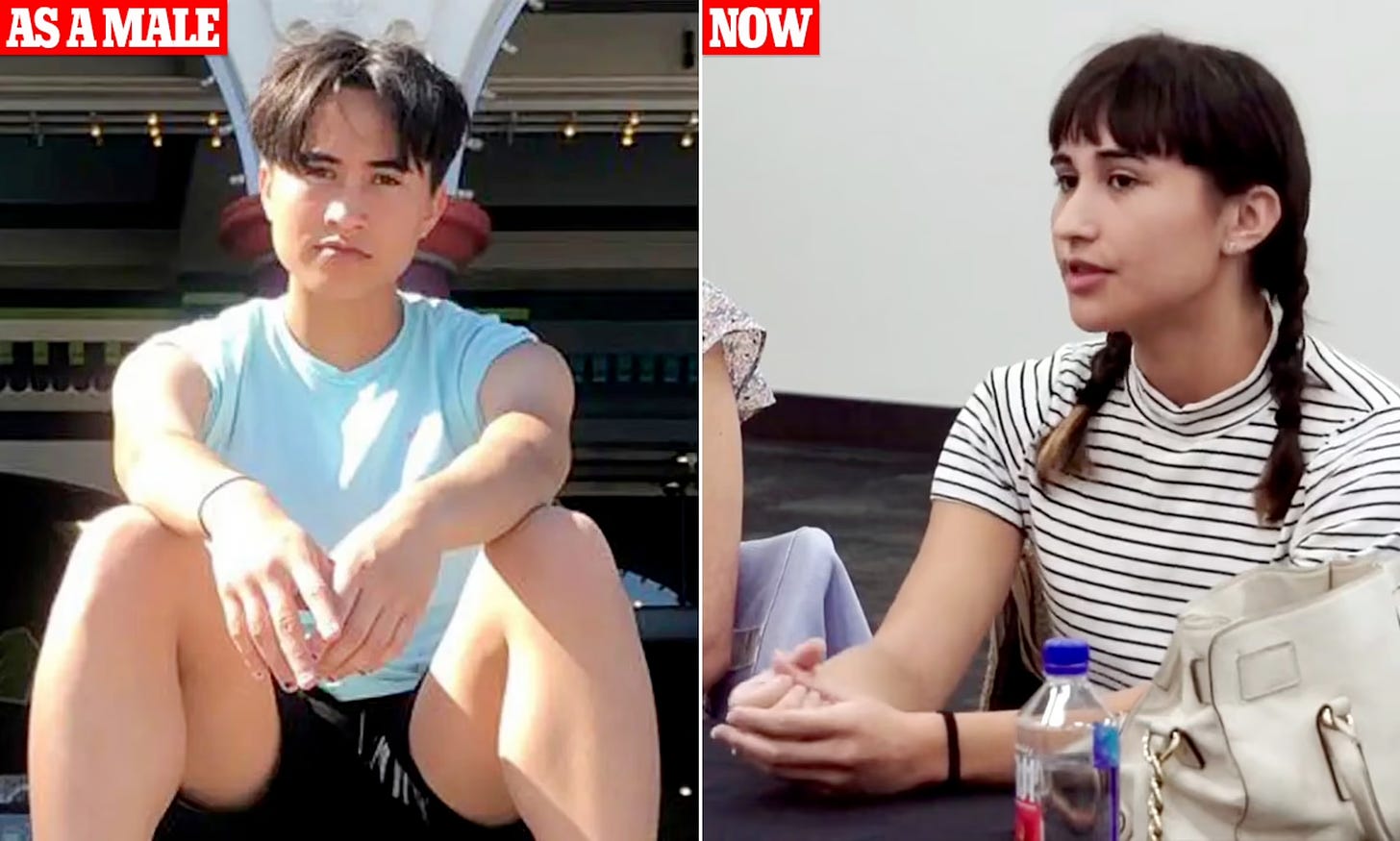 </figure>
</figure>Chloe Cole is another detransitioner who ultimately regretted her transition. She now speaks out against ‘Gender-Affirming’ health care.
“Over the past decade, there has been as high as a 4000% increase in children being referred to so-called ‘gender clinics’ across the United States. I was one of these children. My name is Chloe Cole, and I am an 18 year old former transgender child. I transitioned from the age of 12 up until 16 when I realized it all was a lie. My story is a cautionary tale,” her speech begins. She asks ‘how did we get here?’ and follows up with “raising these questions is not bigoted.”
This last part is important. We’ll get to that later.
Is this really prevalent enough to influence kids?
“Trans positive” rhetoric, stories, videos, TikToks, Instagram posts are widely shared across the internet. More and more professional establishments are indirectly normalizing transgenderism.
UPMC Children's Hospital of Pittsburgh provides boys who think they are transgender with a detailed guide on “tucking” - a practice of creating a flat front to appear more feminine. UPMC left out the side effects of tucking in their “cons” list. These side effects include urinary tract infections, problems with urine flow and twisting or inflammation in the testicles. Doernbecher Children’s Hospital of Oregon Health & Science University also have a guide on how to tuck.
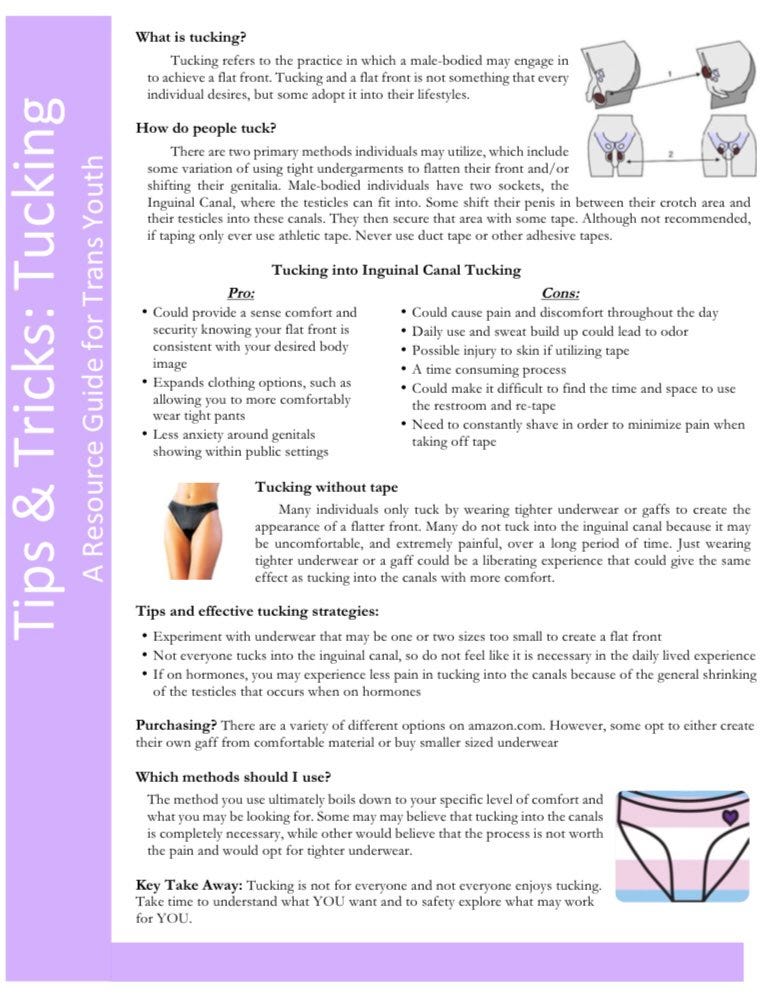 </figure>
</figure>Here are a couple things that popped up on Twitter. (No Twitter isn't the best source for things but these are all backed with video)
■"Dr Dowshen, co-director of the Gender Clinic at @ChildrensPhila, says kids as young as 14 can get double mastectomies and age is just a number For infertility issues from cross-sex hormones & puberty blockers, she explains that some children can already know they don’t want kids" [Click for Tweet video]
■Teacher of elementary school children introducing them to transitioning in terms they can understand. "Teacher discusses coming out as transgender to elementary students- “I used to be a boy but that made me hurt so I went to a doctor.. now I take medicine and I’m a girl” [Tweet video]
■Campaign staff for a candidate for governor of Texas, Beto O’Rourke, told an Alex Rosen over the telephone that “of course” 10 year olds would be allowed to get gender transitioning surgeries were O’Rourke to be elected. "Beto campaign staff member calls me and assures me we will be able to transition 10 year old kids. These people are wild. (1/2)" [Tweet video]
I was planning to provide a lot more examples, but I think this clip says it all:
A man who transitioned into a woman asked the president of the United States at the White House about whether states should be able to ban gender affirming healthcare. Joe Biden says no. (Whether he means "no for adults but yes for children," we don't know.)
■"Biden says that it’s wrong for states to ban the mutilation of minor children while being interviewed by a man pretending to be a woman." [Tweet video]
What is the effect of celebrating transitioners?
Circling back to Twitter suspensions provided at the start of this post, not only is transgenderism celebrated, but anti trans sentiment is actively censored. Of course trans people should be worthy of respect and admiration just like anyone else, but we should be allowed to ask whether there are consequences of them being so publicly celebrated?
In her speech, Chloe Cole had to say “raising these questions is not bigoted.” C-Span released a video of Senator Josh Hawley asking Berkeley Law Professor Khiara Bridges what exactly she meant by people “with a capacity for pregnancy.” In the middle of her response, the Law Professor paused and said: “I want to recognize that your line of questioning is transphobic…”
Matt Walsh based his entire documentary What is a Woman? off the notion that even asking questions about transgenderism is considered bigoted or “transphobic.”
<figure> </figure>
</figure>With that in mind, I think if I were to translate Jordan Peterson’s earlier tweet into a more tame question, it would be something like:
Could a celebrity posting to her 6 million followers on instagram this photo with the caption “Trans bb’s first swim trunks #transjoy #transisbeautiful” have an ultimately negative effect on impressionable kids who are confused about who they are?
This is a tough question. After all, Elliot Page is a fully-grown adult who should have the right to do what he wants with his body. He also happens to be famous and have an Instagram. What are you going to do? Tell him not to post because his mere existence is a “bad influence” on kids?
It’s a tricky situation, but we should be able to have a conversation about it without being labeled a bigoted “transphobe.” Maybe, just maybe, kids should not be legally able to take endocrine modifying pills or have gender “affirming” surgery before they’re old enough to drink alcohol.
